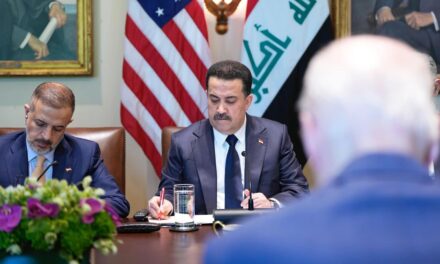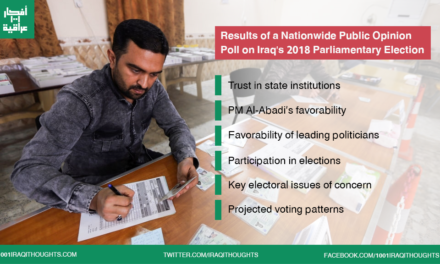(Photo: University of Halabja social media)
In mid-April, a man shot and killed his wife in front of her mother in Erbil, Kurdistan Region of Iraq. Sadly, this event made her at least the fourth Kurdish woman killed in less than a month, and it was not the first of its kind nor will it be the last, as gender-based violence is a great challenge.
Although the Kurdistan Regional Government (KRG) faces financial and political crises, Kurdish society faces additional challenges in the form of violence against women, family disintegration and high divorce rates. In recent years, the record of violence committed against women has risen and includes different forms: domestic violence, gender-based violence, sexual violence and honor killings.
According to the data released by Directorate of Combatting Violence against Women in KRG, from 2008 to 2017, violence against women in the region increased by 60.7 percent. During that period, 56,979 cases of violence against women were recorded: 474 killings, 504 suicides, 2,334 burning, 1,254 self-immolation, 51,213 lawsuits, and 1,209 cases of sexual violence. In November 2020, dozens of NGOs and women’s rights centers ran a two weeklong campaign for raising awareness and standing against violence towards women. During the campaign, the Directorate of Combatting Violence against Women published that, in 2019 alone, exactly 120 Kurdish women lost their lives due to gender-based violence. During 2020, at least 25 women died, 38 others committed suicide, 67 self-immolated, 10,370 lawsuits were filed, and 125 sexual assaults were recorded, according to the General Directorate.
Moreover, the cases of divorce among Kurdish families in the region sharply increased during 2019. According to data released by Legislation Council of Kurdistan Region, about 11,000 cases of divorce were recorded, which amounts to an average of 40 per day. In comparison with the previous year, this was an increase of 42 percent. By 2020, 931 cases of divorce were recorded monthly.
Ruwayda Mustafa, a Kurdish activist, raised her concerns for Thomson Reuters where she argued that there is no clear understanding or policy between the Central Government of Iraq and the KRG on how to reduce and eliminate gender-based violence. She writes: “Women’s groups have also failed to show and real visibility in leading change within the region, leaving a handful of NGOs to raise awareness of abuse”.
Searching for a role model for the Kurdistan Region and for Iraq as a whole is a worthy endeavor. From this point of view, I call for using the example of the Hawraman region to inspire change in other regions of Iraq, from north to south. The culture of Hawraman region values and respects women, as should the rest of Iraq. Interestingly, in Hawraman, there are no shelters, centers or campaigns for combating violence against women, as the recorded-list cases of violence against women is already low. According to the General Directorate: “there is no any office of women rights organizations in Hawraman, as the recorded cases of violence against women in this region is clean”.
Hawraman is a multicultural mountainous region on the border line of Iraq and Iran, straddling both countries and situated 500 km northeast of Baghdad and 400 km west of Tehran. The population of Hawraman is estimated to be 600,000-700,000 in both countries. In Iraq, 60,000 Hawrami native speakers live mainly in Halabja, while some 50,000 fled to other cities in Iraq and to Europe. Regardless, Hawrami people speak in their own native dialect, although Hawrami dialect is considered the fourth dialect of the Kurdish language. In contrast to Kurdish language, Hawrami is grammatically gendered with each verb, noun, and adjective assigned either male or female positions. Hawrami people mostly are Sunni Muslims, and some follow Yarsan/Kakaiy and Zoroastrian faiths. Apart from Mawlawi, Saydi, Besarani, Masturai Ardalan, and Khanai Qubad’s influence on Kurdish literature, Hawrami citizens both male and female are prominent figures and are active in Kurdish politics, academia and governance.
One of the interesting aspects of Hawraman is the position of women in sociopolitical contexts. Ashna Ali, a researcher and activist claims: “From the early history we heard that Hawrami women had energetic participation in daily life responsibilities”. After mentioning the name of Mastura Ardalani as one of the top women in leadership, Ashna added “in recent times women are successful leaders, the rector of university and mayor of Halabja province are outstanding examples”.
Hamid Baram, the director of Biyara district (Hawraman) confirmed that: “they don’t accept violence against women, the respect of women is culturalized to our society from childhood, and as a result, there are no any recorded cases of violence.” He added: “equality between men and women has been adopted from ancient periods and both worked together and lived together peacefully”.
The peaceful adaptation of Hawraman’s culture with the participation of women and women right leads to several factors, Shahla Fathi a Kurdish researcher and activist argues that, throughout history we have golden ages of male-female partnership in all sectors of life of Hawraman. She states that, “Hawrami women played a crucial role in the governance and protecting their homelands from attackers in different historical periods, we cannot note any discrimination in the responsibilities between men and women”.
Despite the grammatically gendered bases of Hawrami language, the literary perceptions of authors, poets and singers in this region glorify the role of women as a prestige of its nation. Najih Gulpi, author of the collection of Hawrami Grammar emphasized that when reading Hawrami language and literature, one can explores the influences of peaceful culture and rich civilization on all sectors of life: “…currently, the director of Halabja University, the mayor of Halabja province and dozens of institutions in this region are led by distinguished Hawrami women”.
Over the past two decades, what the Kurdistan Regional Government and the Government of Iraq tried to do for women’s rights is notable, from the annual budget of governments for combating and countering violence against women, to empowering women and women leadership. However, it is crucial to raise awareness about the understanding and acceptance of women, rather than rebranding their rights by providing quotas in elections and governmental participation.

Momen Zellmi
Momen Zellmi is a political analyst, researcher and diplomatic consultant based in Erbil, Iraqi Kurdistan. He has a PhD in Language Education Policy and an MA in English language and has published numerous works in the fields of politics, language and educational policy, gender, and culture.










